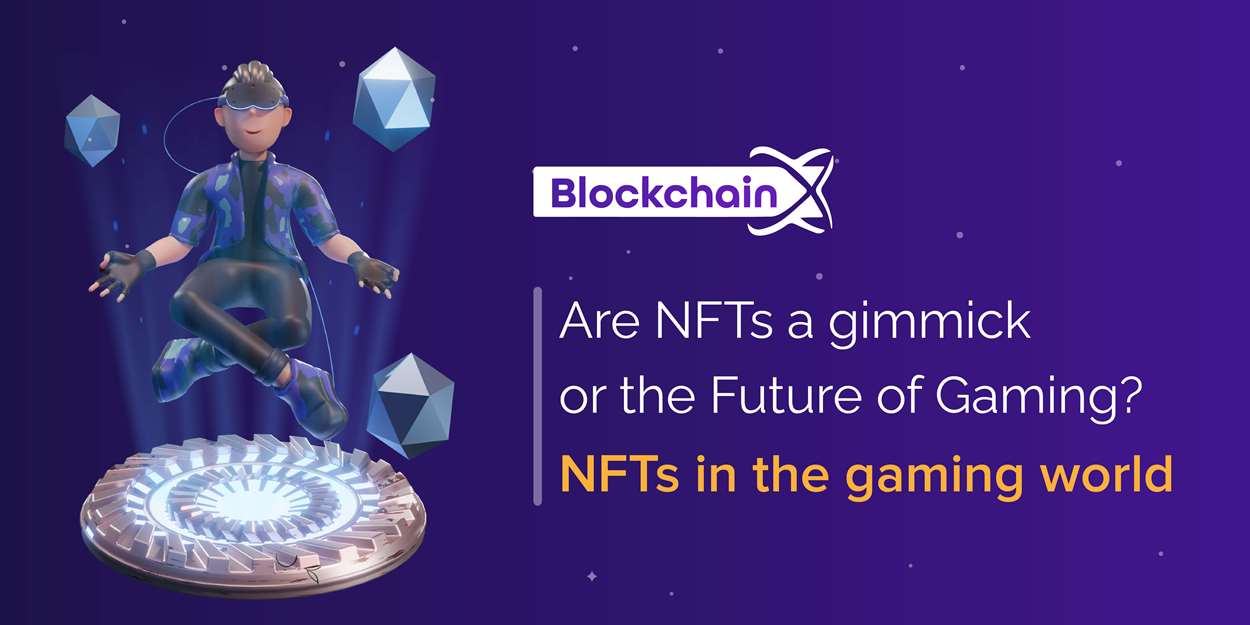We are sure that by this point, you have heard about NFTs. While some think NFTs are just a passing trend that won't last more than a few years, they are actually the ones that are here to stay. NFTs games are a hot topic right now, and it is more evident than ever in the gaming industry.
Perhaps you've seen online discussion on Bored Ape NFTs and wondered why there was such a fuss over cartoon Simians and some Twitter users suddenly flaunting strange hexagonal avatars. Maybe you've heard that NFTs are going to play a significant role in the game world in 2022, but what exactly are they? How is it helping the future of the gaming industry?
What are NFTs in games?
The term "Non-Fungible Token" for a digital item is represented by the acronym NFT, whether it is used in gaming or not. But even though the name suggests otherwise, the concept is actually fairly simple. An NFT is a certificate of ownership for a digital good that is only expected to be produced in a limited number of units. They may be joined by memes created using digital images, videos, or even something as abstract as the World Wide Web's original source code. If something is "fungible," it means it may be exchanged for another thing, like a dollar bill.
You always hold the certified token associated with a particular digital item when you have an NFT for it on a digital ledger regardless of its format. Simply put, you receive a unique link that proves your connection with that digital asset. Much like someone can own a highly valuable car in the physical world in NFT games. NFTs present an opportunity to claim a stake in a small portion of the digital landscape.
What NFTs projects have been announced in the gaming space?
NFT games have been created by smaller companies and are becoming more popular in the mobile gaming industry, despite the fact that western AAA developers have yet to announce any games centred around NFTs. When players use NFT games as a secondary source of income, Central and Southeast Asia have shown a particularly favourable response. The Sandbox, Gods Unchained, and DeFi Kingdoms are among the best-known games. In the most prominent game, Axie Infinity, each creature (referred to as an axe) has its own unique NFT with its own strengths and weaknesses. It is an Ethereum-based battler that falls in between Hearthstone and Pokémon-style fighting. Axie, however, was just the victim of an unprecedented hack that cost an estimated $625 million USD in losses.
In order to ensure that all funds are recovered or returned, the creators, Sky Mavis, stated that they are "working with law enforcement agencies, forensic cryptographers, and our investors." They also stated that they would make adjustments to try to prevent other malicious attacks. Many gamers who depend on the game for their livelihood have been devastated by the exploit and are now pleading with the hacker to return their stolen cash. The most well-known NFT game experiencing such a significant breach raises concerns about the financial security of blockchain games, their acceptance in society, and the safety net systems in place to safeguard consumers who invest their money and confidence in the NFT gaming.
Konami
To commemorate the 35th anniversary of Castlevania, Konami released an NFT collection of artwork and animated gifs. They were able to sell all 14 NFTs for an average price of $12,000 per meaningless database entry on Opensea despite the contempt of many players. Apparently, if the present owners sell these NFTs, Konami receives a sizable 10% fee. The undead horror of loot box NFTs, or GFTs as Atari called them, was brought to us by the reanimated corpse of Atari. GFTs were NFTs with mystery images, and players weren't able to determine which image their NFT was until the big reveal on February 28. Although several are being resold by the original customers on Opensea, they appear to have sold out (an NFT marketplace powered by Ethereum). According to Atari, GFT owners will be able to access a future VIP club in The Sandbox, an Ethereum-based game metaverse, using their GFTs.
Team17
Team17 tried to develop a line of NFT art collectibles based on their strategy series Worms, but they received so much backlash from gamers and video game developers that they had to cancel the project the day after it was announced. The NFT failure is now Team17's most significant problem because of the controversy, which prompted employees to speak out about difficult working conditions, low pay, sexual harassment, and managerial dissatisfaction.
STALKER 2
Similar to this, the developer of STALKER 2 swiftly changed tack on NFTs and cancelled their in-game NFTs (which were planned to allow owners to become in-game NPCs) in response to criticism.
Not all of the top athletes support the NFT Technology. Perhaps to avoid the negative publicity surrounding NFTs, Valve decided to restrict titles featuring them from the Steam platform. The Epic Games Store, a competitor, declared that they are "open" to NFT games in contrast.
NFT gaming will either become popular in the general population or remain a specialist interest, but only time will tell. We doubt the solemn NFT project cancellations on Twitter are over while the debate continues. Future efforts to implement NFT weapons or NFT avatars that can be used in different shooters or games may be made by certain major industry companies.
What do we, as consumers, stand to gain from the development of NFTs, though, if Nintendo was able to make Miis functional in Mario Kart AND transferable between consoles without the help of NFTs?
A change in game design concept would be the only thing that NFTs could possibly stand for. NFTs and the decentralised blockchain may signal the transfer of creative control to players. But given how the majority of game developers are currently addressing NFTs, sceptics aren't persuaded that NFTs in gaming would be anything more than rebranded microtransactions with an unacceptable carbon footprint. Video games may benefit from fascinating applications of cryptographic ideas, but the industry has yet to answer the question of how effectively, morally, and sustainably NFTs can be incorporated into the gaming industry.
The Future of NFT Gaming
In a similar way to how other blockchain technologies have transformed other industries, NFT gaming is in some ways revolutionising the gaming sector. What bitcoins did for banking, NFTs did for video games. They changed the conventional model, where the majority of the benefits from an individual engaging in their system are gained by powerful centralized institutions, to one where the individual is empowered and compensated more equally.
NFTs are the game industry's future. Why would someone choose a game that costs them money instead of making them money when the user experience and gameplay of NFT games can genuinely rival immersive games like World of Warcraft, Grand Theft Auto, and Fortnite ? NFT games will provide a number of micro-economies where gamers can make money while enjoying their favourite games. It's every gamer's dream, and depending on your country's cost of living, it might be a full-time job, a side business, or something akin to winning the jackpot.
Ultimately,
Is there actually a future for NFTs in gaming? The technology is still in its infancy, so there are a lot of obstacles standing in the way of its widespread acceptance. To make NFTs a useful component of the gaming space rather than just another way for businesses to make an easy profit, game companies would need to be open to the idea of decentralisation of digital items and cooperate. This is in addition to the legality of digital items being traded between multiple different games at any given time, and the future of gaming and NFTs is substantial.

